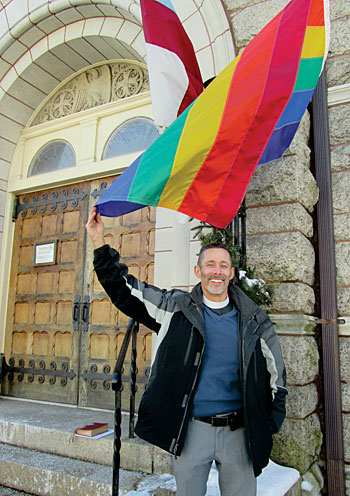APS looks to improve climate for LGBT physicists
DOI: 10.1063/PT.3.2716
An ad hoc committee of the American Physical Society (APS) is looking into issues relevant to lesbian, gay, bisexual, transgender (LGBT), and other sexual- and gender-minority physicists. The charge of the committee is to investigate their “representation in physics, assess the educational and professional climate in physics, recommend changes in policies and practices that impact LGBT physicists, and address other issues that affect inclusion.” The nine-member committee will report to APS in spring 2016.
The APS committee stems from a request by LGBT+ Physicists, a group started in late 2009 by Elena Long, now a postdoc in nuclear physics at the University of New Hampshire. A trans woman, Long got involved in activism because she was “concerned I could be fired for being LGBT.” While working as a graduate student at the Thomas Jefferson National Accelerator Facility, she led a successful lobbying effort to amend the lab’s employment policies to bar discrimination based on sexual orientation or gender identity. Later, meeting other LGBT physicists helped her stay in the field, she says. “The draw of leaving behind the work I love for a culture that is more accepting was tempting.”
“Are we underrepresented? We just don’t know. But we do know that some of us have experienced exclusionary behavior,” says Michael Falk, a materials physicist and gay man at the Johns Hopkins University who chairs the APS committee. Data indicate that attitudes in academia are heterogeneous, notes Falk. “Some campuses are welcoming, while at others faculty report experiencing hostile work environments. Nonacademic workplaces are most likely similarly diverse in their levels of acceptance. We will try to get a handle on that.”
When LGBT physicists get together at APS meetings, as they have for the past five years, they trade notes about whether to be out of the closet with PhD advisers and prospective employers, whether their university or company offers benefits to partners, and what their health insurance provides. Some employers offer health plans for pets but not for same-sex partners. Long notes that only 32 US colleges offer transgender-related health care for employees. Many plans won’t pay for treatments for transgender individuals, even for health issues unrelated to their transition.
On a policy level, the most important issue for LGBT physicists is employment discrimination, Long says. Other issues range from obtaining visas for same-sex partners from other countries to ensuring a work environment is friendly to LGBT employees. For trans people, problems can arise in seemingly simple things like handling name changes on publications and finding bathrooms they can comfortably use.
One problem that a lot of LGBT people face, says Tim Atherton, an assistant professor at Tufts University who is serving on the APS committee, “is that they are carrying their identity as LGBT, and maybe also as a minority or a female, in one basket and identity as a physicist in another basket. They need to be properly integrated for one to be most productive.” Life is stressful, Atherton continues. “Research funding is terrible for everyone. I have no time for the added stress [of not being out]. And I am at a supportive institution. What [LGBT physicists] are asking for from everybody is empathy and recognition that some people have had negative experiences. Maybe we can collectively be a bit nicer.”
Michael Ramsey-Musolf, a theoretical physicist at the University of Massachusetts Amherst, says he puts a rainbow flag on the first slide of every talk he gives. “It is a small but concrete action we can take to enhance visibility and raise awareness.” For his and other personal stories of LGBT physicists, see the Singularities

After experiencing unwelcoming environments, Michael Ramsey-Musolf left three tenure-track and tenured positions before arriving at the University of Massachusetts Amherst. The openly gay nuclear and particle theorist is director of the Amherst Center for Fundamental Interactions. He is also an Episcopal priest.
JENNIE HAKKARAINEN

The committee invites readers to send comments, suggestions, and concerns to lgbtcontact@aps.org
More about the authors
Toni Feder, tfeder@aip.org





